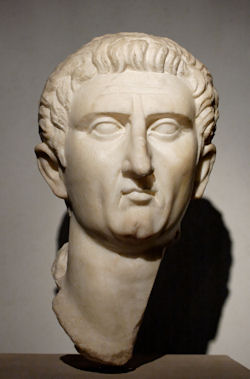M. Coccaius Nerva
 M. Coccaius Nerva, the eleventh Roman emperor in succession from Augustus, was born AD 33, in the twentieth year of the reign of Tiberius. It is curious that his name is scarcely mentioned in history till he ascended the imperial throne, after he had passed his sixtieth year. He was probably the relation of Cocceius Nerva, who is described by Tacitus (Amt. vi. 26) as distinguished for his knowledge of law, and as having put himself to death rather than survive his friends, who had fallen a sacrifice to the tyranny of Tiberius.
M. Coccaius Nerva, the eleventh Roman emperor in succession from Augustus, was born AD 33, in the twentieth year of the reign of Tiberius. It is curious that his name is scarcely mentioned in history till he ascended the imperial throne, after he had passed his sixtieth year. He was probably the relation of Cocceius Nerva, who is described by Tacitus (Amt. vi. 26) as distinguished for his knowledge of law, and as having put himself to death rather than survive his friends, who had fallen a sacrifice to the tyranny of Tiberius.
Nerva was consul AD 71, being the second year of the reign of Vespasian, and a second time AD 90, in the tenth year of the reign of Domitian; but history records nothing for which he was distinguished. Towards the close of Domitian’s reign, he was in exile with many good men at Tarentum; and hearing of the bold defence made by Pliny the younger for the inhabitants of Baetica against Boebius Massa, he wrote to Pliny to congratulate him on the example he had given. (Plin. Ep. iii.)
When the conspirators had resolved to put to death the Emperor Domitian, they found it no easy task to discover a person who would agree to be his successor, as every one suspected that it was a snare laid by Domitian himself to entrap them. Nerva, however, was persuaded to run the risk, an astrologer having some time before predicted that he would ascend the imperial throne.
In due course, Domitian was murdered on 18 September AD 96, and Nerva was on the same day saluted emperor. The kind and benevolent disposition of Nerva must have been doubly felt from its strong contrast with the ferocious cruelty of his predecessor. One of his first acts was to release all those who had been accused of what was designated impiety, which consisted of the slightest neglect of respect to the emperor or his statues. This law was of so comprehensive a nature, that it was scarcely possible to escape, and the only chance seemed to be, by being active in the accusation of others. Domitian had also passed a severe law against those who practised Jewish rites, by which profane writers no doubt also meant the followers of the Christian religion. But Nerva refused to listen to any such accusations. Whatever property had been taken unjustly by Domitian was restored to its lawful owners; and he at the same time did every thing in his power to lessen the expenses of the state.
He married Eurydice, the daughter of Clyrnenus. He swore in the senate that no senator should be put to death by his orders; and even when a conspiracy was formed against him, he kept to his resolution. He used frequently to say that he had done nothing to prevent him living in safety as a private citizen if he chose to lay down his authority. The praetorians did not object to him, although he was not a man to their taste. He remained faithful to the senate, and proceeded in his reforms with great caution. Hence he punished but few of those who had been the curse of the nation in the reign of his predecessor, and many of them escaped with impunity and were allowed to remain at Rome. In this manner the people still continued to stand in awe of them, as they might rise again at any time, but Nerva could not act otherwise. At length Casperius, the praefect of the city, who had held the same office under Domitian, demanded of Nerva to punish the murderers of Domitian, and compelled him to make a public declaration in which be approved of theexcution of those murderers.
He felt the disgrace of this act very keenly, and in order to strengthen himself, he adopted Trajan, who had then the command of the legions on the Rhine. By this adoption Trajan became the declared successor and Nerva certainly made a better choice than Galba had made. In nothing did he show his sagacity and his anxiety to secure the happiness of the empire more than by his adoption of M. Elpius Nerva Trajanus to be his successor, although he was not without many near relatives. The reigns of Nerva and Trajan belong to the most obscure portions of the history of the Roman empire, although it is a period which was rich in literary productions. Trajan himself wrote memoirs of his war against the Dacians, but no writer of any importance refers to them.
Nerva died, after a reign of sixteen months, on 27 January, AD 98, in the sixty-fifth year of his age.
|
NEWSLETTER
|
| Join the GlobalSecurity.org mailing list |
|
|
|

